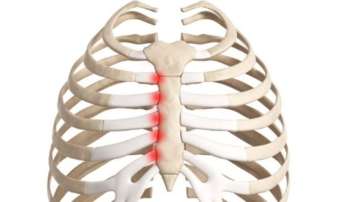Costochondritis is often referred to as “chest wall pain” or “costosternal syndrome". It is a condition that involves inflammation of the cartilage that connects the ribs to the breastbone. It can cause chest wall pain and tenderness. It can affect people at any age, but it is more common in women than men, especially those who are in their 30s or 40s.
Symptoms of Costochondritis
The most common symptom of costochondritis is a sharp pain in the chest that can radiate to other parts of the body. This pain can also be accompanied by tenderness when pushing on the affected area. Other symptoms include fatigue, difficulty sleeping, and difficulty breathing. The pain may become worse with physical activity or when lying down.
Causes of Costochondritis
The cause of costochondritis is often unknown, but there are some potential causes that can contribute to it. These include trauma or injury to the chest wall, certain infections, repetitive strain or overuse of certain muscles, and stress-related tension. It can also be related to other conditions such as fibromyalgia and autoimmune diseases.
When it comes to treating costochondritis, there are several options available. The goal of treatment is to reduce inflammation and pain, so medications such as nonsteroidal anti-inflammatory drugs (NSAIDs) can be useful. Physical therapy can help improve posture and help relieve muscle tension that may be contributing to the problem. In some cases, local injections of corticosteroids may be necessary to reduce inflammation and pain.
For more severe cases of costochondritis, surgery may be necessary. The procedure involves cutting away the affected cartilage or rib to reduce tension in the area. However, surgery should only be considered as a last resort as it carries risks such as infection and pain at the site of the incision.
No matter what treatment option you choose for your costochondritis, it’s important to make sure you get plenty of rest and stay active. Staying active can help improve your mobility and reduce muscle tension that may be contributing to your chest pain. You should also avoid activities that are likely to worsen your symptoms such as excessive lifting or contact sports.
